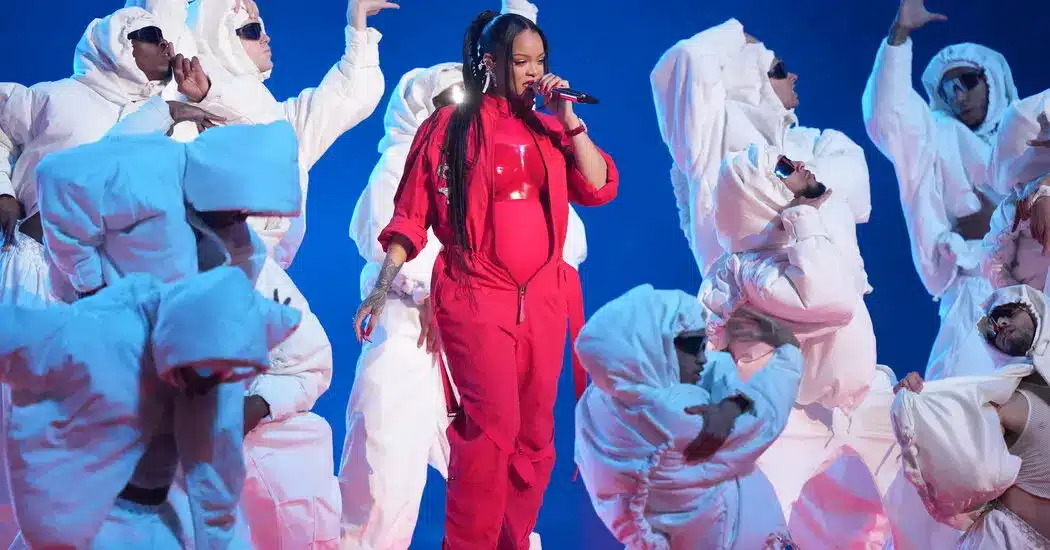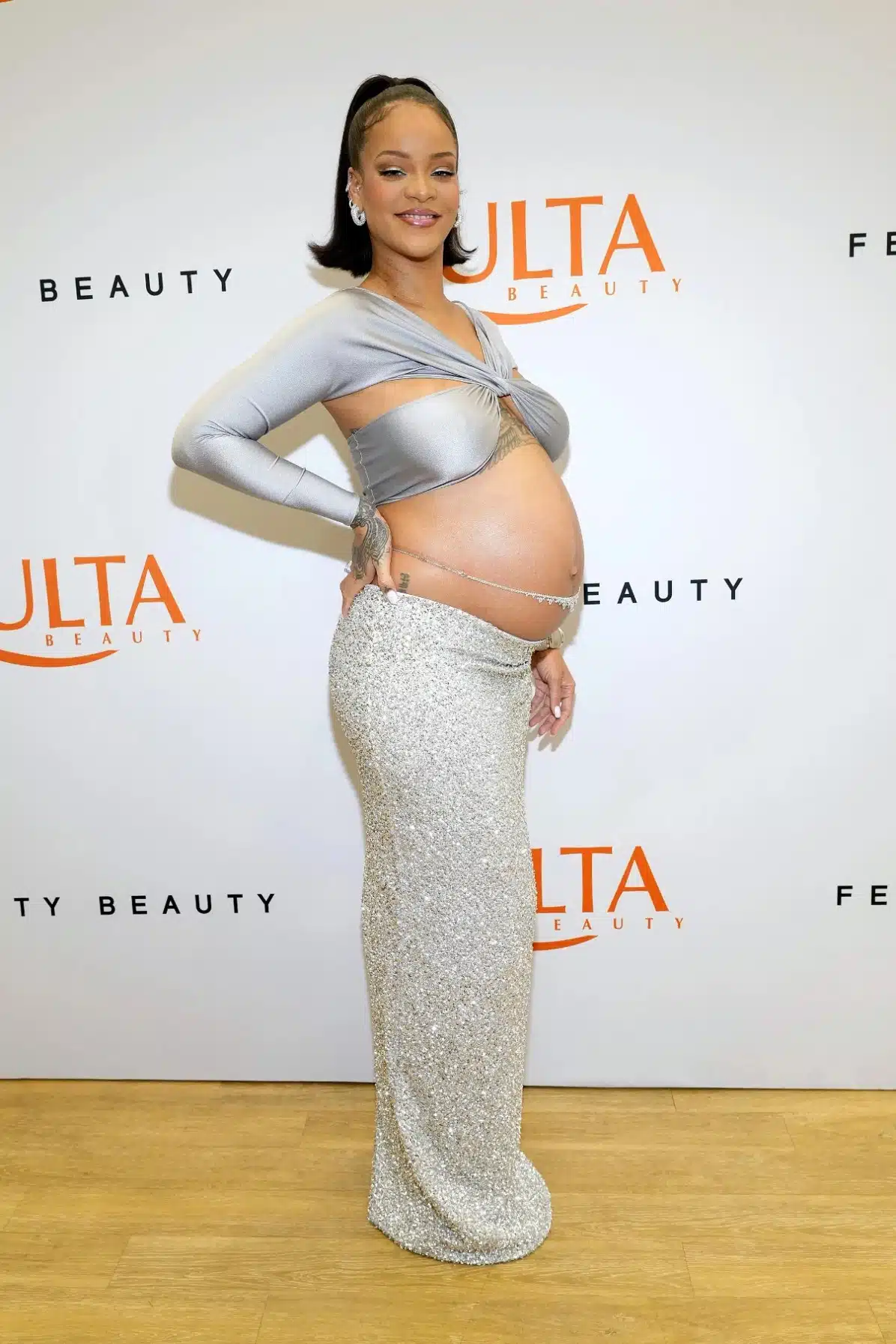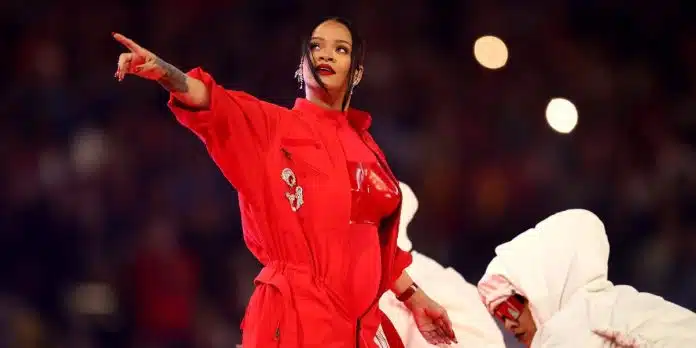After seven years of being mainly absent from the stage, the singer and businesswoman used the halftime performance to play a dozen classics, reference her non-musical company, and announce her pregnancy.
Red-clad and clutching a microphone at her side, Rihanna poses onstage during the Super Bowl halftime concert.
During the Super Bowl halftime performance, Rihanna performed twelve songs. A spokeswoman said she is expecting her second child.
Moments after Rihanna left the Super Bowl LVII halftime stage in Glendale, Arizona, on Sunday night, her agent confirmed what her performance had suggested: the singer is expecting her second child.
Compared to Beyoncé’s belly massage at the 2011 MTV Video Music Awards, it was a less dramatic pregnancy announcement. However, for Rihanna, who gave birth to her first kid last year, it was a stroke of stage acumen — maybe the only move that could outshine and redefine the performance she had just produced.
Rihanna has not released an album since 2016’s “Anti,” and many of her devoted fans interpreted her readiness to perform at this year’s Super Bowl as a hint that she may soon return to music. She might perhaps reveal a new song, album, or tour.
Instead, she utilised one of the most prominent venues in pop music to demonstrate that she had a private life to return to despite communal expectations. Therefore, if her actual performance on stage had been a little fatigued, well, there were more pressing matters to consider.

In 13 minutes, Rihanna casually delivered snatches of 12 hits, songs that are generally recognised and do not need much embellishment or bombast. The closest she got to frisson, sass, authority, and energy was just after the set’s midway point.
Rihanna snatched a compact from the extended hand of one of her dancers, applied two dots of powder — a gesture to Fenty Beauty, which has been a greater professional priority for her in recent years than music — and returned it before snatching the microphone from another dancer with her left hand.
Then she went into the hook of “All of the Lights,” a duet with Ye (formerly Kanye West) that dates back more than a decade. West’s antisemitic rants late last year have made him an outcast. She soon followed that tune with “Run This Town,” a second duet with Ye (and Jay-Z).
A fast cosmetics ad? Sure. A tacit declaration of solidarity for a colleague in peril? Why would you not? Rihanna, one of the most important pop artists of the 21st century, is less dependent on the Super Bowl than the Super Bowl is on her, and her performance was a model of doing just enough. She approached it similarly to how many people approach their professional commitments when their personal lives are calling: with a sense of duty, mild enthusiasm, exhaustion, and a desire to work the angles.
Rihanna, the queen of nonchalance, debuted Sunday night on a stage hovering above the 50-yard line while performing “Bitch Better Have My Money” (a move borrowed from Ye’s 2016 Saint Pablo tour). She was attached to the platform, which limited her manoeuvrability, but once she reached the ground, she did not overemphasise dancing, instead holding court in the middle of 100 or more dancers, participating in their moves but never surpassing them. During “Work,” she led the group as if she were a teacher calling out movements but not doing them herself.
Rihanna’s successes are many and diverse; she has charted on the Billboard Hot 100 more than sixty times. However, there was no apparent theme running across this collection of twelve cherished tunes. She focused mostly on the upbeat side of her discography (“Where Have You Been,” “Only Girl (in the World)”), with allusions to her Caribbean roots in “Work” and “Rude Boy.” At the conclusion of the concert, she highlighted her one-word-title, big-picture hits “Umbrella” and “Diamonds,” which favour exaggeration above emotion.
Rihanna is a new mother, a rich fashion and cosmetics magnate, and an astoundingly dependable pop artist with extensive discography. However, she is not an active hitmaker. Since 2016, she has not done a concert of this magnitude.

So, in its promotion, the Super Bowl emphasised that landing her most conspicuous endeavour in years was a coup. During promotional teasers, Apple Music’s Ebro Darden prophetically said, “The wait is over. Is almost over.”
The event was essentially her presence. The occasion was the occasion. Despite the regularity and strength of her partnerships, there were no visitors. Despite her status as a fashion creator, she wore a single red dress, removing and adding layers as necessary.
Even though the performance was quick and rushed, it seemed sluggish. There was minimal variety in tone or vigour, and there were no artistic references to the set list’s light themes. It was a routine meant to activate well-honed pleasure regions, not generate fresh passion; its success was predetermined.
The fact that Rihanna appeared at all is evidence of the NFL’s skill in covering up its scandals or performing over them. She refused to play at the Super Bowl in 2019, a time when declining performance on one of the world’s largest platforms seemed political in reaction to the NFL’s response to Colin Kaepernick’s protest. In the years that followed, however, Jay-Roc Z’s Nation’s engagement with the league altered the halftime performance musically and socioculturally.
From an entertainment standpoint, this has been ideal. And for Rihanna, performing at halftime is a milestone commensurate with the magnitude of her accomplishments. However, her performance was neither aggressively political nor especially appreciative of her long list of successes. Instead, it worked as a placeholder of sorts. She had really come to perform. However, she has more serious matters to attend to.


